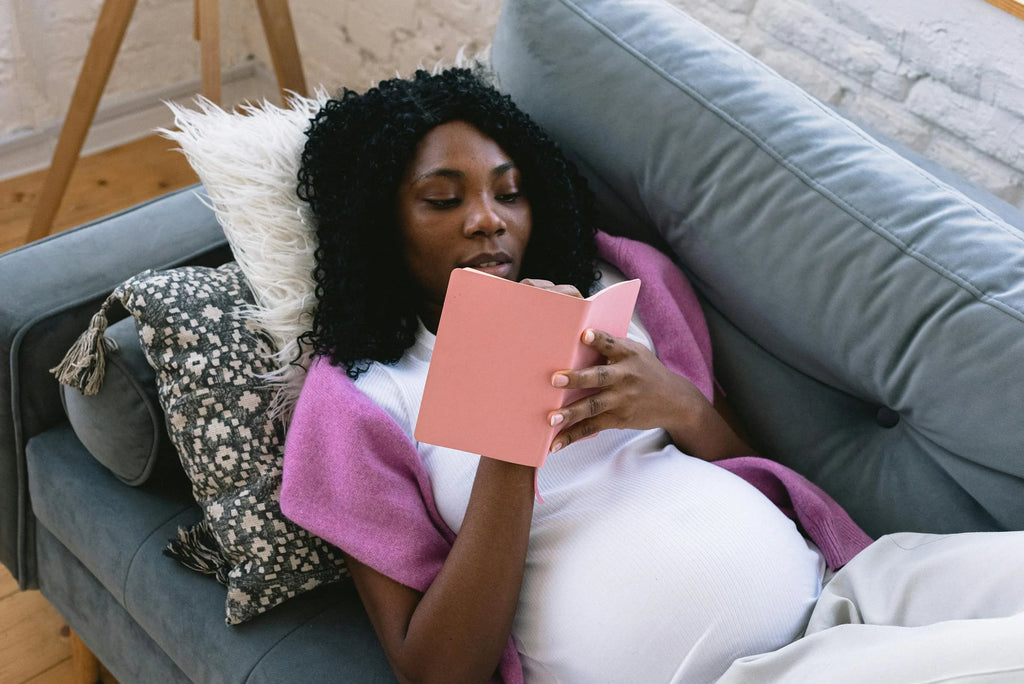Home
Pregnancy & Breastfeeding Tips for New Moms: Preconception, Pumping & Parenting Support
Can You Have Pregnancy Symptoms Before a Positive Pregnancy Test?

Can You Have Pregnancy Symptoms Before a Positive Pregnancy Test?
If you’re actively trying to conceive or just suspect you might be pregnant, you’ve probably found yourself closely monitoring your body for signs. A twinge here, a wave of fatigue there—and suddenly you're wondering: Could this be a pregnancy symptom, even before I get a positive test?
It’s a common and valid question. Many women report “just knowing” they were pregnant before they ever saw those two pink lines. But how much of that intuition is backed by biology? Can pregnancy symptoms really appear before a pregnancy test can confirm anything?
In this blog, we’ll explore how early pregnancy symptoms might begin, how they relate to the timing of pregnancy tests, and what you should do if you’re experiencing symptoms but still getting negative results.

How Early Can Pregnancy Symptoms Start?
Overview of Early Pregnancy Symptoms
Pregnancy symptoms can start surprisingly early—some women report noticing changes as soon as a few days after ovulation. These early signs are usually subtle and easily mistaken for premenstrual symptoms, but they often arise from the body’s hormonal shifts in preparation for supporting a pregnancy.
Typical Timing in Relation to Conception
After ovulation, if sperm fertilizes the egg, the newly formed embryo begins to travel down the fallopian tube toward the uterus. Implantation usually occurs between 6 to 12 days after ovulation. This is when the body begins to release human chorionic gonadotropin (hCG)—the pregnancy hormone detected by tests.
While hCG levels may not yet be high enough to yield a positive test, the body may already be responding with symptoms triggered by increasing progesterone and estrogen levels.
Variation Between Individuals
The timing, intensity, and type of early pregnancy symptoms vary significantly from person to person. Some women feel noticeable changes before a positive test, while others may not notice anything unusual until well after a missed period. There’s no one-size-fits-all pattern, which is why it’s important to combine symptom tracking with reliable testing methods.
Common Early Pregnancy Symptoms
Breast Tenderness and Swelling
One of the earliest and most noticeable signs of pregnancy is breast sensitivity. Rising levels of estrogen and progesterone after conception increase blood flow to breast tissue, causing fullness, tingling, soreness, or swelling. You may also notice that your nipples become darker and more pronounced, and the areolas (the area around the nipples) may enlarge. This symptom can appear as early as 1–2 weeks after conception, even before your missed period.
Fatigue and Tiredness
Extreme tiredness is another hallmark of early pregnancy. In the first few weeks, progesterone levels surge, which can have a sedative effect. At the same time, your body is diverting energy to support the growing embryo, increasing your metabolic demands and possibly lowering blood sugar and blood pressure. The result? You may feel like you’re dragging through the day or needing naps, even if you’re getting enough sleep.
Nausea or Morning Sickness
Although commonly referred to as "morning sickness," this symptom can strike any time of day. Some women begin to feel nauseous shortly after implantation, though it’s more typical to experience it around week 5 or 6 of pregnancy. The cause is believed to be a combination of hCG levels, estrogen, heightened sense of smell, and a more sensitive digestive system.
Mood Swings and Irritability
Fluctuating hormone levels—especially progesterone—can lead to emotional ups and downs. Many women report feeling unusually weepy, anxious, or irritable in the early days of pregnancy. These mood shifts are very similar to those experienced during PMS but may feel more intense or prolonged.
Spotting or Implantation Bleeding
Light spotting that occurs 6–12 days after ovulation could be implantation bleeding, which happens when the fertilized egg attaches to the uterine lining. It’s usually very light—pink or brown, rather than red—and lasts a day or two. Many women mistake this for the beginning of their period, but if it’s lighter than usual and followed by a missed period, it may actually be one of the first signs of pregnancy.
Bloating and Cramping
You might feel bloated or experience mild cramping, similar to what you feel before your period. This is due to hormonal shifts that relax the digestive tract and increase blood flow to the uterus. These sensations can begin soon after implantation and are often misinterpreted as a sign of menstruation.

Why Symptoms May Appear Before a Positive Test
Hormonal Changes Before Detectable hCG
After implantation, the embryo begins to produce hCG—but in the very early days, the amount is very low. However, your body is already experiencing changes due to increased progesterone and estrogen, especially if you’re highly sensitive to hormonal shifts.
The Difference Between Symptom Onset and hCG Detection Timing
It’s entirely possible to experience pregnancy symptoms before hCG levels are high enough to register on a urine pregnancy test. In fact, many tests are not sensitive enough to detect hCG until it reaches 25 mIU/mL, which can take several days post-implantation.
This is why some women feel pregnant even when their test still shows negative—it’s not all in your head; it’s just too early to confirm.
If you're trying to pinpoint the best time to test, MomMed Ovulation Test Strips can help you accurately track your ovulation window. This ensures you're counting days properly and gives better context for when symptoms and testing align.
When Does a Pregnancy Test Turn Positive?
How Pregnancy Tests Detect hCG
Pregnancy tests work by detecting the presence of hCG in your urine. After implantation, hCG production begins and doubles every 48 to 72 hours in early pregnancy. Once levels rise above the test’s threshold, you’ll see a positive result.
Typical Timeframe for Positive Test Results
Most home pregnancy tests can reliably detect hCG about 12–14 days after ovulation, or the first day of your missed period. Testing earlier often leads to false negatives, as your hCG levels may not be high enough yet.
Factors Affecting Test Sensitivity and Timing
Some pregnancy tests are more sensitive than others. High-sensitivity options (detecting hCG as low as 10 mIU/mL) can give earlier results, but even then, timing matters.
For reliable early detection, MomMed Pregnancy Test Strips offer high sensitivity and over 99% accuracy when used correctly. They're a cost-effective option for frequent testing and come with easy-to-use collection cups and clear instructions.
Other Causes of Early Pregnancy-Like Symptoms
PMS (Premenstrual Syndrome) Similarities
PMS is the most common reason for early symptoms being confused with pregnancy. Symptoms such as bloating, breast tenderness, fatigue, irritability, and cramping often mirror those of early pregnancy. The difference is subtle and typically only becomes clear over time—either through the onset of menstruation or a positive pregnancy test.
Hormonal Fluctuations Not Related to Pregnancy
Hormonal imbalances caused by stress, thyroid issues, or polycystic ovary syndrome (PCOS) can cause symptoms that are eerily similar to pregnancy. For instance, PCOS can lead to missed periods, bloating, and mood swings—easily mistaken for pregnancy signs.
Digestive and Gastrointestinal Issues
Bloating, nausea, and appetite changes are not exclusive to pregnancy. Irritable bowel syndrome (IBS), food sensitivities, or even minor stomach bugs can cause similar discomforts. These symptoms are usually shorter-lived and accompanied by other signs like diarrhea or indigestion.
Excessive Stress and Anxiety
When you’re hyper-focused on the possibility of being pregnant, your body can mimic pregnancy symptoms due to heightened awareness and anxiety. This is sometimes called a psychosomatic response. Your brain can interpret mild changes—like a flutter in your stomach or tiredness—as pregnancy-related, even when they’re not.
Lifestyle Changes or Sleep Deprivation
Changes in your routine, like a new workout plan, a poor diet, or lack of sleep, can leave you feeling fatigued and off balance. These issues may also disrupt your menstrual cycle, leading to missed or irregular periods, further complicating self-diagnosis.

What to Do If You Have Symptoms but Negative Tests
When to Retest and How Often
If your first test is negative but you’re experiencing symptoms, wait a few days and test again. Since hCG levels rise rapidly, waiting 48–72 hours can yield a more accurate result.
Use first-morning urine, which has the highest hCG concentration, and avoid excessive fluid intake before testing.
Consulting a Healthcare Provider
If symptoms persist and home tests continue to show negative results, your doctor can perform a blood test to detect lower levels of hCG or order an ultrasound to assess what's going on. This is especially important if you’re experiencing unusual pain or spotting.
Tracking Symptoms and Menstrual Cycle
Keeping a symptom and cycle log can be helpful not just for conception, but also for understanding your hormonal patterns. Apps or physical journals help track ovulation, sexual activity, symptoms, and test results over time for a clearer picture.
Conclusion
Yes, it’s possible to experience pregnancy symptoms before getting a positive pregnancy test result—but that doesn’t mean every symptom points to pregnancy. Hormonal changes, sensitivity to progesterone, and the timing of implantation all play a role in the disconnect between what you feel and what the test shows.
If you're seeing symptoms but getting negative tests, give your body time. Continue to monitor closely, test again in a few days, and don’t hesitate to seek professional advice if you're unsure. And remember, combining symptom awareness with accurate tracking tools like MomMed Pregnancy and Ovulation Test Strips can give you the clarity and confidence you need on your fertility journey.


